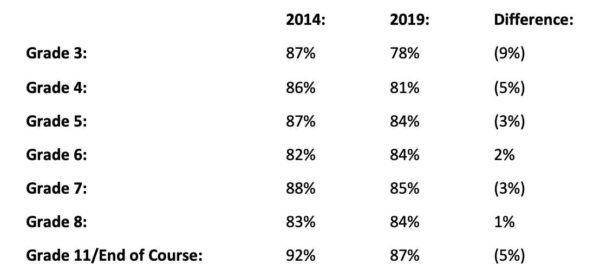 Peter’s Take is a biweekly opinion column. The views expressed are solely the author’s.
Peter’s Take is a biweekly opinion column. The views expressed are solely the author’s.
The American Public Media podcast by Emily Hanford, “At a Loss for Words: How a flawed idea is teaching millions of kids to be poor readers”, thankfully is shining a national spotlight on non-scientifically-based reading instruction. Ms. Hanford specifically criticizes Lucy Calkins’ Units of Study for Teaching Reading (Readers’ Workshop), the Fountas & Pinnell Leveled Literacy Intervention (LLI), and Marie Clay’s Reading Recovery, for perpetuating the vicious cycle that “prevent(s) kids from focusing on words in the way they need to become skilled readers.”
Arlington Public Schools (APS) uses all of these resources, and in some cases, with our most vulnerable students.
APS reading SOL’s:
Although it’s debatable if the Virginia Reading Standards of Learning (SOL) is a valid and appropriate measurement of reading proficiency during any given year, the Reading SOL is what Virginia uses to measure reading proficiency over time. Here’s a comparison of APS’ proficiency rates on the Reading SOL from 2014 and 2019:
Overall, APS is trending in the wrong direction. Today more students are non-proficient readers than in 2014. The most significant declines have occurred in third grade — the pivotal year in which a student reads to learn versus learns to read. As noted by the Annie E. Casey Foundation’s report, “Early Warning! Why Reading by the End of Third Grade Matters”, a failure to read proficiently by third grade often puts a student on a success or failure trajectory. It’s imperative that APS laser focus on this downward trend in the K-2 grades.
What is APS doing about it?
Literacy Training: Many of Virginia’s university teacher preparatory programs fail to teach our teachers how a student learns to read and how to identify, instruct, remediate, and accommodate students with reading disabilities. Therefore, the burden falls on the K-12 schools to train teachers after they are hired. Last year, a small cohort of APS supervisors and specialists were trained in LETRS, to help teachers embed scientifically researched-based literacy instruction in the classrooms, regardless of what resources are used.
Early Identification: Since 1997, the Virginia Department of Education (VDOE) has provided districts with the Phonological Awareness Literacy Screening (PALS) tool to identify students in K-3 who are at risk for reading failure. But PALS isn’t effectively identifying all of our at-risk students and isn’t identifying the root causes for why a student is struggling or may struggle when text becomes more complex. Although PALS takes considerable time to administer, it doesn’t provide the information required to meet students’ needs. Therefore, APS began piloting the Rapid Automatized Naming/Rapid Alternating Stimulus Test (RAN/RAS), to supplement PALS. As a result, APS now identifies additional students that may not have been identified using PALS.
Phonics and Phonemic Awareness Instruction: In September 2019, APS set the expectation that all K-2 students receive 30 minutes of daily, systematic, explicit phonics instruction and all grade 3-5 students receive 20 minutes of daily, systematic, explicit word level instruction. In addition to phonics instruction, all kindergartners must receive daily phonemic awareness instruction using the Heggerty curriculum. Historically, phonics instruction was a minor part of weekly literacy instruction and APS didn’t have a phonemic awareness curriculum.
Data Driven Case Studies: This year, APS will examine cohorts of students whose reading proficiencies are improving and individual students who are closing their reading achievement gap to better understand (1) what training their teachers had, (2) what screeners and resources were used, and (3) how instruction was delivered.
Conclusion: Twenty-two percent of APS 3rd graders failing the Reading SOL is unacceptable. If these students don’t quickly catch up, they will miss years of instruction in every subject that is accessible only to proficient readers. Our teachers will be challenged to remediate and accommodate these non-proficient readers as they matriculate through elementary and secondary school, having ripple effects on every student. APS must get back to basics: keep prioritizing literacy and expanding and improving these recent initiatives. Every student deserves to be literate.
Peter Rousselot previously served as Chair of the Fiscal Affairs Advisory Commission (FAAC) to the Arlington County Board and as Co-Chair of the Advisory Council on Instruction (ACI) to the Arlington School Board. He is also a former Chair of the Arlington County Democratic Committee (ACDC) and a former member of the Central Committee of the Democratic Party of Virginia (DPVA). He currently serves as a board member of the Together Virginia PAC-a political action committee dedicated to identifying, helping and advising Democratic candidates in rural Virginia.


